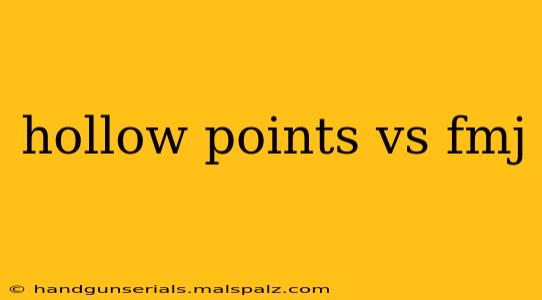Choosing the right ammunition is crucial, whether you're a law enforcement officer, a responsible gun owner focused on self-defense, or an enthusiast dedicated to target practice. This detailed comparison of hollow point (HP) and full metal jacket (FMJ) ammunition will help you understand their key differences and make an informed decision based on your specific needs.
Understanding Hollow Point Ammunition (HP)
Hollow point bullets are designed with a cavity or hollowed-out tip in the bullet's nose. This design significantly impacts their performance upon impact. When a hollow point bullet strikes a target, the hollow cavity allows the bullet to expand, mushrooming out and creating a larger wound channel. This expansion leads to increased stopping power and energy transfer, resulting in quicker incapacitation.
Advantages of Hollow Points:
- Increased Stopping Power: The expansion of the bullet creates a larger wound cavity, causing more tissue damage and leading to faster incapacitation of the target. This is crucial in self-defense situations where immediate neutralization of a threat is paramount.
- Reduced Overpenetration: The expansion of the bullet dissipates more energy within the target, significantly reducing the risk of the bullet penetrating through the intended target and injuring bystanders or causing damage beyond the intended area. This is a critical safety consideration in populated areas.
- Superior Expansion in Soft Tissue: The design of hollow points is specifically optimized for expansion in soft tissue, maximizing their effectiveness against living targets.
Disadvantages of Hollow Points:
- Higher Cost: Hollow points generally cost more than FMJ ammunition due to the more complex manufacturing process.
- Potential for Reduced Accuracy in Certain Situations: While generally accurate, factors like bullet construction and the specific firearm can influence accuracy. Some hollow point designs might be more susceptible to fouling or malfunction in certain guns.
- Functioning in Certain Firearms: Some older firearms or those with tighter bores might experience feeding or cycling issues with hollow point ammunition.
Understanding Full Metal Jacket Ammunition (FMJ)
Full metal jacket (FMJ) ammunition features a lead core completely encased in a metal jacket, usually copper or gilding metal. This design prevents the bullet from expanding upon impact. FMJ rounds tend to travel further and penetrate deeper than hollow points.
Advantages of FMJ:
- Lower Cost: FMJ ammunition is generally less expensive to produce than hollow points, resulting in a lower price point for consumers.
- Consistent Penetration: The full metal jacket ensures consistent penetration, making FMJ rounds ideal for target practice and applications where deep penetration is required (e.g., certain types of hunting).
- Reliable Functioning in Most Firearms: FMJs generally function reliably in a wider variety of firearms due to their consistent shape and construction.
Disadvantages of FMJ:
- Lower Stopping Power: The lack of expansion means FMJ rounds have less stopping power compared to hollow points. They may pass through a target without causing significant immediate incapacitation.
- Increased Risk of Overpenetration: Because they don't expand, FMJ bullets have a higher risk of overpenetration, potentially endangering bystanders or causing unintended damage.
- Less Effective in Self-Defense Situations: For self-defense, the lower stopping power and higher risk of overpenetration makes FMJ ammunition less suitable than hollow points.
Choosing the Right Ammunition: Self-Defense vs. Target Practice
The choice between hollow point and FMJ ammunition ultimately depends on your intended use:
Self-Defense: Hollow point ammunition is generally the preferred choice for self-defense due to its superior stopping power and reduced risk of overpenetration. The increased safety to bystanders outweighs the higher cost.
Target Practice: FMJ ammunition is often preferred for target practice due to its lower cost and consistent penetration. This allows for more affordable training and allows shooters to focus on technique rather than worrying about ammunition performance variations.
Always consult your firearm's manual to ensure compatibility with the ammunition you choose. Improper ammunition selection can lead to malfunctions and potentially dangerous situations. Safe and responsible firearm handling is crucial regardless of the type of ammunition used.

